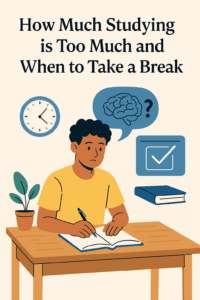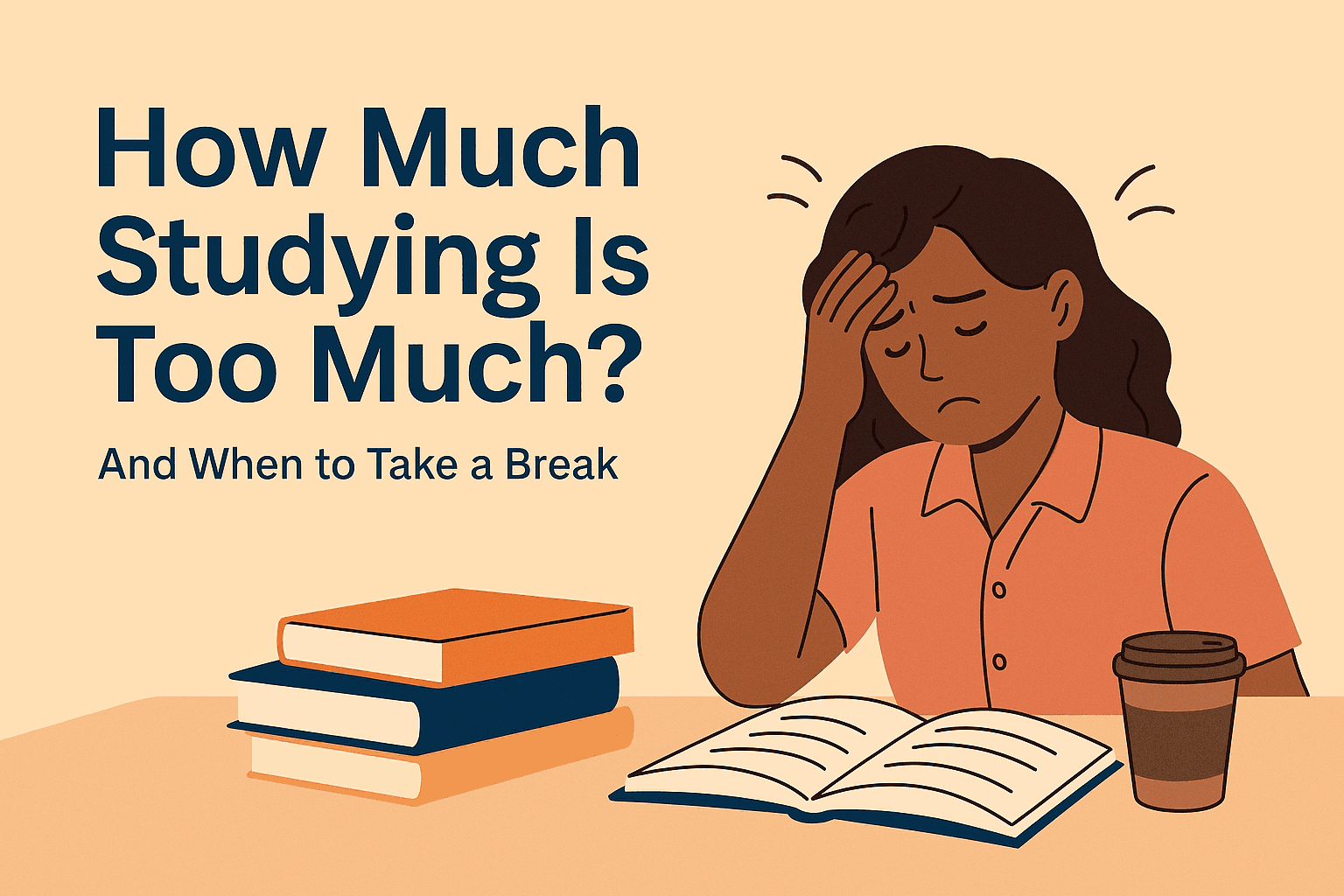As a Nigerian undergraduate navigating the demanding academic environment of universities like UNILAG, ABU, or polytechnics like YabaTech, you know the pressure of juggling coursework, exams, and personal responsibilities. The question “how much studying is too much” often arises when you’re buried in notes, racing against deadlines, or preparing for high-stakes exams like JAMB or semester finals.
This comprehensive guide explores the limits of effective study sessions, identifies signs of overstudying, and provides practical strategies to maintain mental and physical health. We’ll share actionable study break tips, insights on crafting an effective study schedule, and methods to prevent student burnout, ensuring you study efficiently while prioritizing well-being.
Whether you’re at a university, polytechnic, or college, these tips are tailored to help Nigerian students thrive academically without compromising health.
Understanding the Limits of Your Study Sessions
Your ability to focus intensely varies based on personal, environmental, and academic factors. The question “how much studying is too much” doesn’t have a universal answer—it depends on your health, stress levels, and study environment. Cognitive research suggests the average brain maintains peak focus for 45-90 minutes before needing a break. For Nigerian students, external challenges like unreliable power, noisy hostels, or financial pressures can shrink this window, making it essential to prioritize quality over quantity.
Marathon study sessions, like all-nighters before exams, are a common but risky habit in Nigeria’s competitive academic culture. The American Psychological Association notes that sleep deprivation impairs memory consolidation, meaning long hours may lead to poor retention. Instead of cramming, focus on structured, high-quality study blocks to maximize learning and avoid exhaustion. Recognizing your limits helps you study efficiently and maintain long-term productivity.
Factors Influencing Your Study Endurance
Several factors shape how long you can study effectively. Physically, poor nutrition—common when students rely on quick meals like garri or indomie—reduces stamina. Mental stressors, such as worrying about tuition fees or family expectations, drain focus. Environmental challenges, like studying in a hot room without electricity, further limit endurance. For example, a student in a crowded Lagos hostel might struggle more than one in a quieter setting. Tailoring your study sessions to these realities helps prevent overstudying.
The Science Behind Attention Span
Cognitive science supports techniques like the Pomodoro Method, which recommends 25-minute study bursts followed by 5-minute breaks, aligning with the brain’s ultradian rhythms. Exceeding these cycles without rest causes cognitive overload, making it harder to process new information. For Nigerian students preparing for exams, leveraging this science answers “how much studying is too much” by emphasizing strategic timing over endless hours, reducing the risk of burnout.
Adapting to Your Personal Rhythm
Everyone’s focus rhythm differs. Some students thrive in early mornings, while others are more alert at night. Experiment with study durations—try 25, 50, or 90-minute sessions—to find what suits you.
Signs That You’re Overstudying

Overstudying can creep up unnoticed, but its symptoms are unmistakable if you pay attention. Physically, you might experience headaches, eye strain from prolonged screen or note-reading, or persistent fatigue that rest doesn’t fix. Nigerian students, often balancing academics with part-time jobs or household chores, may notice these signs intensify quickly. Emotionally, feeling irritable, anxious, or unmotivated about studying—tasks you once enjoyed—signals you’re pushing too hard.
In Nigeria’s high-pressure academic system, ignoring these signs can lead to burnout or health issues. For instance, disrupted sleep or frequent illnesses due to weakened immunity are red flags. If you’re forgetting material despite hours of study, it’s time to reassess and incorporate study break tips to restore balance.
Physical Symptoms to Watch For
Your body often signals overstudying first. Chronic muscle tension from poor posture, digestive issues from irregular meals, or frequent colds due to stress are common. Nigerian students, who may skip balanced meals for affordability, face higher risks of nutritional deficiencies that worsen these symptoms. Staying hydrated and eating nutrient-rich foods like beans or vegetables can mitigate these effects.
Emotional and Mental Red Flags
Mentally, overstudying manifests as difficulty concentrating, forgetfulness, or declining grades despite effort. Anxiety and depression, growing concerns among Nigerian undergraduates, can escalate with unchecked study marathons. Spotting these early allows you to adjust your routine, preventing student burnout and maintaining academic performance.
Social Isolation as a Warning Sign
Overstudying can lead to withdrawing from friends or family, a common issue for students in Nigeria’s competitive environment. If you’re skipping social events or study groups to cram, you may be overdoing it. Balancing study with social connections is key to mental health and sustained productivity.
The Importance of Taking Breaks in Your Study Routine
Breaks are critical for effective learning, not optional indulgences. When pondering “how much studying is too much,” know that strategic pauses enhance retention and creativity. Neuroscience shows that during breaks, the brain engages in diffuse mode thinking, processing information subconsciously. Without breaks, you risk mental fog, reduced efficiency, and burnout.
For Nigerian students juggling lectures, group projects, and maybe a side hustle, scheduling breaks prevents overload. Simple study break tips—like a quick walk around campus, stretching, or chatting with hostel mates—recharge focus. These pauses make subsequent study sessions more productive, helping you study efficiently while staying mentally sharp.
Types of Breaks and Their Benefits
Short breaks (5-10 minutes) refresh immediate focus—try deep breathing, stretching, or sipping water. Longer breaks (15-30 minutes) allow deeper recovery, like eating a balanced meal or napping. For example, a quick meal of rice and stew can sustain energy, while a short nap boosts alertness. Tailoring breaks to your needs helps prevent student burnout.
Customizing Breaks for Nigerian Students
Breaks must fit Nigeria’s unique challenges. A short prayer, listening to Afrobeat, or stepping outside during a power outage can lift your mood. If you’re in a noisy hostel, earplugs during a quiet reading break can help. These adjustments make breaks practical and effective, supporting an efficient study routine.
Breaks as a Productivity Booster
Far from wasting time, breaks enhance productivity. A 10-minute walk can clear mental clutter, while socializing during a break reduces stress. By scheduling breaks, you create an effective study schedule that balances effort and rest, ensuring long-term academic success.
Creating an Effective Study Schedule
An effective study schedule answers “how much studying is too much” by structuring time wisely. Start by mapping your weekly commitments—lectures, assignments, and personal responsibilities. Identify peak productivity hours; many Nigerian students prefer early mornings before heat or distractions set in. Limit study blocks to 2-3 hours, with breaks to avoid fatigue.
Account for Nigeria-specific disruptions like traffic, power outages, or family duties by building buffers into your schedule. Use planners or apps to stay organized, ensuring you study efficiently while maintaining flexibility for life’s unpredictability.
Daily vs. Weekly Planning Strategies
Daily plans focus on immediate tasks, like reviewing lecture notes or completing assignments. Weekly plans align with broader goals, such as covering a course syllabus or preparing for exams. Combining both creates a balanced, effective study schedule that prevents cramming and reduces stress.
Incorporating Flexibility for Nigerian Student Life
Nigeria’s unpredictability—fuel scarcity, ASUU strikes, or family obligations—demands flexible scheduling. Build extra time into your plan and identify backup study spots, like libraries with generators or quiet campus corners. This ensures consistency without overstudying, even when life throws curveballs.
Using Technology to Stay on Track
Digital tools can streamline your schedule. Apps like Google Calendar or Todoist help track tasks, while platforms like Distinction offer AI-driven study planning. Distinction’s progress tracking and timed practice tests make it easier to stick to your schedule, ensuring you study efficiently.
Practical Tips to Prevent Student Burnout
Preventing student burnout requires proactive steps beyond spotting symptoms. Set realistic goals: break syllabi into weekly chunks rather than cramming entire courses. Stay hydrated, eat nutrient-rich meals (like yam, stew, or groundnut soup), and aim for 7-9 hours of sleep nightly to recharge.
Exercise, like a 20-minute campus jog or yoga, boosts endorphins and clears mental clutter. Social connections are vital—join study groups or chat with friends to combat isolation. These strategies help you study efficiently while safeguarding mental and physical health.
Nutrition and Exercise for Sustained Energy
Balanced meals fuel long study days. Affordable options like beans, rice, or vegetables provide sustained energy. Simple exercises, like jumping jacks or stretching during breaks, improve circulation and focus, supporting an effective study schedule.
Mindfulness and Stress Management Techniques
Mindfulness practices, like deep breathing, gratitude journaling, or short prayers, reduce exam stress. Free meditation apps, accessible on basic smartphones, offer quick relief. These techniques help Nigerian students manage pressure and prevent burnout.
Building Resilience Through Routine
Consistency builds resilience. Small habits—like daily note reviews, setting phone reminders for breaks, or sticking to a sleep schedule—create a sustainable study routine. Over time, these habits reduce the risk of overstudying and enhance academic performance.
Seeking Support When Needed
Don’t hesitate to seek help if burnout looms. University counseling services, peer study groups, or even family support can make a difference. Online communities, like Nigerian student forums, offer relatable advice and encouragement, reinforcing your efforts to study efficiently.
Tools and Resources to Study Smarter, Not Harder
Studying smarter means leveraging tools to optimize time and effort, directly addressing “how much studying is too much.” Digital resources can track progress, suggest breaks, and personalize learning, making them invaluable for Nigerian students.
Distinction is a standout platform for undergraduates. Its AI-powered features include timed practice tests that simulate exam conditions, progress tracking to monitor improvement, and personalized study guidance to optimize your learning path.
Ready to transform your study routine?
Sign up for Distinction at distinction.app and start studying smarter today.
Free tools like Pomodoro timers or note-taking apps are useful, but premium platforms like Distinction offer advanced analytics tailored to Nigerian students’ needs. Combine these with study break tips for a balanced, effective routine.
Free vs. Premium Study Apps
Free apps provide basics like flashcards or timers, while premium tools like Distinction offer not just that but also AI-driven insights and exam simulations. Choose based on your budget and goals to avoid overstudying and maximize efficiency.
Community Resources for Nigerian Students
Engage with university study groups or online forums like Nairaland for peer support. Nigerian student blogs offer relatable study break tips and advice on creating effective study schedules, addressing local challenges like power cuts or transport delays.
Leveraging Local Libraries and Study Spaces
Many Nigerian universities and polytechnics have libraries with backup generators, offering quiet spaces for focused study. Community centers or cafes with Wi-Fi can also serve as alternatives, helping you maintain a consistent routine despite environmental challenges.

In conclusion, mastering “how much studying is too much” means listening to your body, structuring time wisely, and using tools like Distinction to enhance efficiency. By adopting study break tips, preventing student burnout, and following an effective study schedule, you’ll excel academically while staying healthy. Success isn’t about endless hours—it’s about smart, sustainable effort. Start implementing these strategies today and watch your productivity soar.




